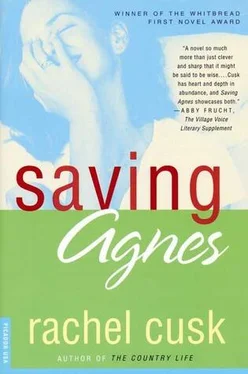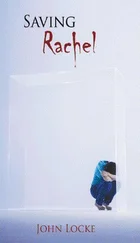At moments like these something seemed to open up vastly beneath her and she would lurch, gasping, towards its vacancy. Once, ages ago, Merlin had said that he thought she was lucky to have been born into a ready-made set of religious beliefs. This had, he claimed, imbued her from childhood with an instinctive relation to the Other, which others spent lifetimes trying to achieve. At the time she had sneered at his Otherisms; she knew the grandees of her creed by name, had its hierarchies graven upon her heart. That particularly nasty strain of belief that was mysticism, to which she assumed he was referring when he spoke of the wasted lifetimes of the agnostic world, had nothing whatsoever to do with her own high-pedigree catechism; and appeared to her to consist mainly of the desire to explain phenomena such as spectral activity, telepathy and alien spacecraft.
Now, however, she too was beginning to detect something querulous within herself; doubtful yearnings which could not, it seemed, be answered by her story-book religion with its sacraments and sacrifices. The sun came out behind the stained-glass windows, illuminating their peopled mosaic with colour as if through chromatic aberration. She needed something bigger, less constricting, something more applicable to the modern world, of which, after all, she was a part. She gazed at the bright pieces of glass. Their colours were luminous, gorgeous lozenges with dark rheumatic joints. She found herself becoming so hypnotised by them that she could no longer see the figures which arose out of their union. They floated blurrily in and out of her field of vision, quaint and heraldic: the glass ghosts of a divine fiction, a land neither dead nor living; a whole world of human hope caught worshipping the sun.
The visitors’ book had been there ever since she could remember. She flicked through it, reading the comments. ‘V. Good’, someone had written, as though marking an essay. Others picked up adjectives and passed them on like an unimaginative virus: ‘lovely and peaceful’; ‘peaceful and beautiful’; ‘beautiful and quiet’; ‘quiet and lovely’. She turned back to the comments which predated this verbal epidemic. Most of them were from children, gleefully seizing the rare opportunity to give their small opinions. ‘A good place to sit and think’, wrote Tim, aged five. Agnes wondered what a five-year-old had to think about. She went to the beginning of the book, where the writing, dated from 1975, had begun to fade. Her eye lighted on one childish script. ‘It’s good to quietly hide’, it read. She looked along the line for the name of this splitter of infinitives, this timorous asylum-seeker, this petrified wisp who saw so little in the world to reassure her. Agnes Day, aged six and a half.
As she walked home, Agnes passed a tree which had been struck by lightning. Its demise was not recent. In fact, Agnes had never known it to be any other way. She and Tom had used to play there, climbing up into its truncated top where there had formed a high, hollowed dish lined with soft moss. It had stumpy arms which the climber could easily grasp, scorched smooth with few scratchy twigs. They had delighted in its useful deformity and would spend hours there while the wheat-fields planed flatly around them to the horizon, muddybrown and stark in winter, waving golden in summer.
Agnes jumped over the small ditch beside the road and began to climb the tree. It was much easier than she remembered. In less than a minute she was at the top of the crippled trunk. She heaved herself over the side and sat down in the bowl of its distended open neck. Almost immediately she was suffused with warmth. It had always been mysteriously warm in that tree, she remembered. This was probably owing to the shelter it provided against the biting East Anglian winds, but Agnes and Tom had entertained the theory that the fire which smote it still coursed, ghost-like, around its blackened remains.
She drew up her knees and hugged them against her chest, rocking back and forth. In such historic locations, one could allow the years to roll back unabated. She thought of all the time she had seen pass and felt sad; not for its irretrievability, for she was haunted by its taste and tincture still; but for herself, helpless as she had so often been before the things which befell her, bewildered and credulous and afraid. And for the fact that all along she had been there, always there, trailing along in the wake of her aspirations, driving through her days with eyes fixed in a rear-view mirror on the road behind; always there, popping up in every memory like coincidence, the reluctant and culpable star of her own recollections.
The dark furrows striating the iron-hard winter fields fanned out around her to the horizon. She had been here many times before. She knew them by heart. Their familiarity struck her just then as rather menacing, as if she had come to the end of something. Only yesterday, had she not demanded of her mother to know when it would be, this defining moment, this ‘in the end’ that everybody spoke of? Well, perhaps it was here. She knew this place. The connection crackled round her like an electric circuit, bleakly synchronising things. Perhaps she had no more time to start again. Perhaps she would not be saved. Indeed, there was an apocalypse at hand and it was perhaps no more than this: that she had been here before!
Her history welled up in her: things burned, frozen, buried alive, a whole disordered catalogue of stories told or hidden. She alone could make sense of them. She alone could tell it as it was, for who else would remember? She must begin! She would begin, with the seeds of a starting place planted here in her revisiting, to tell of the mysterious normality of things, of their unexceptional symmetry, of the uninterrupted rise and fall of days; of how one could wait, could waste as much time as there was between birth and burial waiting for things that never came!
The low plain of the darkening sky cupped over her like a giant hand, creased with clouds. She felt herself growing smaller before it, until finally she was tiny and the years had gone back and it was summer, and she was tasting once again the loveliness of unknowing, the certainty of belief, the delicious prospect of a future as yet untold. She had been in no hurry — she had had all the time in the world; and yet still she had thought then that it would be better than this. She raised herself on her knees and peered over the top of the tree. A sudden blast of icy wind slapped her cheeks. In dreams, she had perched in its withered breast as if at the prow of a ship: the wind coming off the fields into her hair, the sun nipplewarm and magnetic, the wheat a dragonfly ocean of swaying stalks over which they appeared to be sailing.
AGNES came back from her parents’ house to a London cloaked with the promise of a storm. Although it was still early evening King’s Cross was deserted, as if a nuclear alert had sounded moments before her arrival. The air smelled oddly grassy and fresh. A strong wind whipped down the Gray’s Inn Road, causing litter to scuttle and fly along the pavements. Agnes got on the underground, scenting change.
When she got home, Nina was lounging around the house as if she lived there. By now the wind was bellowing through the empty streets and as Agnes entered the hall a sudden gust slammed the door ferociously shut behind her. Nina jumped up nervously from the sofa at the sound and Agnes saw her make a dash for the staircase. She herself, however, had had precisely that exigent means of escape in mind, and the two of them encountered one another at the foot of the stairs like embarrassed acquaintances caught in a chemist’s buying condoms.
‘I thought you were away,’ accused Nina.
Читать дальше












